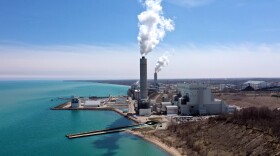Dr. Stephen Carpenter, of UW-Madison, is one of 18 international authors sharing the message that humans are impacting the world's ecosystems and changes must be made to ensure life on Earth continues.
The paper, Planetary boundaries: Guiding human development on a changing planet, was published on January 15th in the journal Science.
The collaborative work is receiving attention. It was a topic of discussion among business, government and academic leaders last week at the 45th annual World Economic Forum.
https://www.youtube.com/watch?v=9zbgsyOpuKQ
Its authors are studying nine planetary boundaries, which they believe, if kept in check, humanity will be able to live sustainably. The boundaries include:
- Climate change
- Change in biosphere integrity (biodiversity loss and species extinction)
- Stratospheric ozone depletion
- Ocean acidification
- Biogeochemical flows (phosphorus and nitrogen cycles)
- Land-system change (for example deforestation)
- Freshwater use
- Atmospheric aerosol loading (microscopic particles in the atmosphere that affect climate and living organisms)
- Introduction of novel entities (e.g. organic pollutants, radioactive materials, nanomaterials, and micro-plastics).
Stephen Carpenter focuses on phosphorus. He is the Director of the Center for Limnology at the University of Wisconsin-Madison and his lab is on the shores of Lake Mendota, one of the most studied lakes on the planet.
“Lake Mendota, like many lakes in Wisconsin has received overload of phosphorus from agriculture for a long time and prior to that, it received an overload from human sewage, so it has been affected by phosphorus for well over 100 years,” Carpenter says.
He says limnology, the study of fresh water systems, in America started on the shores of Lake Mendota.
“The first limnologist in America worked here,” he says. Carpenter gathered his first sample from its waters 41 years ago, and he adds, "we have a very long history of data from this particular lake. We know the lake is beyond a tipping point, that it has a tremendous amount of phosphorus inside it.”
Carpenter says little scientific uncertainty remains around the impacts of phosphorus on lakes and streams. “We’re darn certain that it causes the algae bloom problems, the fish kills, the toxic algae and so on in Wisconsin lakes," he says.
He says the planetary boundaries were first introduced by a scientists in 2009. Since that time, scientists have taken on even more rigorous analyzes.
Carpenter says its purpose is not to suggest solutions, rather, "the really important message to deliver is there are biophysical boundaries that we need to stay within to maintain civilization and to maintain human well-being."
Carpenter says strategies do exist, for what he calls “three great families of ideas to stay within the planetary boundaries.” They include technological improvement (such as green technology), government intervention where appropriate and human values.
The scientist believes a combination of all three will likely be necessary to “keep humanity on the right track.”






